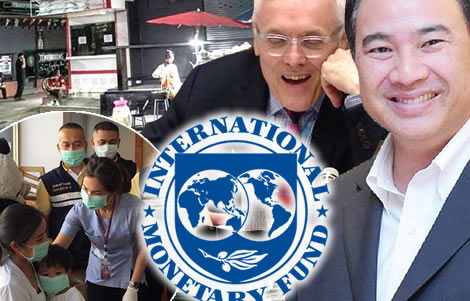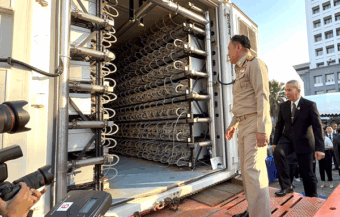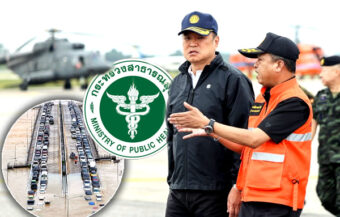‘We’re not going back to normal’ says former WHO director as the cost of economic disruption spirals for Thailand. The IMF has predicted at least a 6.7% contraction this year and the University of the Thai Chamber Commerce predicts that more than one in four jobs will be lost. State of Emergency in Japan as a new wave emerges threatening the country’s health system.
The IMF has indicated that Thailand is going to see a contraction of at least 6.7% this year in its economy making it, by far and away, the biggest loser in Asia from this crisis. It comes as the government is still working on a ฿1.9 trillion programme of supports while also making plans to reopen the country’s shutdown economy. However, many analysts are warning the situation may get worse if the disruption caused by this virus is not brought under control in the third quarter of the year. This week’s bulletin from the IMF itself warned that this factor could lead to a bigger economic crisis even well beyond that seen in the 1930s. On Wednesday night, Dr Amthony Costello, a highly respected UK paediatrician and former director of the World Health Organisation stated bluntly that in the absence of an effective and widely distributed vaccine, that this virus will come in waves which have the potential to cause disruption for the next two to three years.

The latest economic bulletin from the International Monetary Fund is predicting that the Thai economy stands to be the biggest loser in the aftermath of the Covid 19 crisis in Asia. The virus emergency is expected to see the world suffering a steep contraction in GDP this year.
The world financial body has even warned that it’s already disturbing outlook for national economies could deteriorate further if economies are not regularised in short order. The world could be facing ‘severe risks of a worse outcome,’ it warned in shrill terms.
It attributed this to the ’extreme uncertainty around the strength of the recovery’ where, at present, there is a disconnect between economic planners and national governments grappling with medical uncertainty and unknowns as they try to handle the crisis.
Asia may escape contraction this year says IMF
In its bulletin for Thailand, the IMF suggests that Asia may be fortunate to escape a contraction in GDP this year which would be even worse than the 2009 financial crisis based on some growth in China and emerging economies such as Vietnam.
This was in its brightest scenario for the part of the world least impacted. Even in this most optimistic outlook, it predicted Thailand’s economy to contract by 6.7%.
It did predict, however, that Thailand’s economy may come roaring back in 2021 with 5.6% growth if the virus is controlled.
IMF warns that the world is facing a great depression if the virus is not brought under control
The bulletin suggested that developed economies would see a contraction of 6% this year with the rebound for 2021.
However, the international body also warned that the global economy could be facing a crisis far more severe than the Great Depression of the 1930s if this virus manages to destabilise economic activity beyond the 2nd quarter of this year.
This could see more than a 16% contraction in western economies which would be similar or more than that of the 1930s.
Such economic devastation would bring with it the severe risk of further shocks and unintended consequences not least political destabilization especially in Europe.
The IMF bulletin suggested that the British economy would contract by 6.5% this year while the UK government itself has already suggested that this figure will be of the order of 13%.
UK Minister says no going back to normal until a vaccine has been found and made available
In fact, the soundings from the United Kingdom government and key ministers have been ominous in recent days on this issue.
Health Minister Nadine Dorries has just told the public that life will not be brought fully back to normal until a vaccine for the virus has evolved and been widely distributed.
The 62-year-old minister was blunt in her response on Wednesday night: ‘There is only one way we can ‘exit’ full lockdown and that is when we have a vaccine. Until then, we need to find ways we can adapt society and strike a balance between the health of the nation and our economy.’
Former WHO director predicts huge numbers of dead in the UK and warns of infection
On Wednesday, Dr Anthony Costello a respected paediatrician in the UK and former director of the World Health Organisation from 2015 to 2018, put the situation in unambiguous terms.
He said that it would take 2 to 3 years before life in the UK could be normalised and also predicted a huge number of deaths to come until either a vaccine is supplied through the health system or the population develops herd immunity.
He referred to an ‘excellent model’ which shows that up to 50,000 people in the UK will die from the coronavirus in what he termed ‘this particular wave’ which he said will only infect 6.5% of the population.
On that basis, he said it would take 8 waves before herd immunity would start to kick in.
‘We’re not going back to normal’ says former WHO director from the UK on Wednesday night
‘We’re not going back to normal,’ Dr Costello declared. ‘This thing could run for 2 to 3 years.’
He cited a ‘flare-up of the epidemic’ again which we are beginning to see in Singapore, Korea, Japan and China as evidence to support his position.
Japan on Thursday declared a state of emergency and warned that its health system was suffering severe stress from a renewed and virulent wave of infection caused by the virus.
7 million Thai jobs already gone and this will claim up to 10 million says top business leader
It comes as Kalin Sarasin who is the Head of the University of the Thai Chamber of Commerce and a member of Thailand’s Council of government and business leaders claims that 7 million jobs have already been lost due to this catastrophe.
He predicted that a further 3 million will also be lost as the kingdom, like other nations, struggles to control the disease within its borders and the worst effects of damage to the world economy.
‘Unprecedented’ economic hit means 1 in 4 Thais face being jobless even when businesses reopen doors
The current prediction of a loss of ฿1.3 trillion to the Thai economy by some estimates may only account for the damage done to the country’s now closed tourism sector because of this disaster.
Thailand has a workforce of 38 million people and economic experts are suggesting that over one in four will be unemployed in the coming months.
The IMF, in its commentary on the virus this week, repeatedly described this economic setback as unprecedented.
Sweden’s death rate is climbing steeply, it did not shut down its economy like other countries
Sweden, alone among European and Scandinavian countries, did not opt for lockdown measures and a shutdown of businesses despite panicked calls from hundreds of medical experts in recent weeks and a rising mortality rate.
The country has closed secondary schools, universities and banned large gatherings but essentially left businesses open. People are being advised strongly to practise social distancing.
So far, the country has suffered 1,333 deaths with over 12,540 infections. However, the mortality figures have risen steeply in the last few days from 919 on April 13th to 1,333 on April 16th.
Medical and public experts are predicting that the kingdom, with a population of just 10 million people, is facing disaster if the government does not alter its course.
Thai sovereign rating downgraded by S&P
As Thailand’s economic planners put together a financial package to fund the kingdom’s bond market, businesses and income support with an ambitious ฿1.9 trillion fiscal programme to assist the workforce get through the crisis, on Tuesday, the S&P rating agency downgraded the country’s sovereign rating from positive to stable.
The rating was still given at a BBB+ with an A-2 label for short term foreign currency.
‘We expect Thailand’s political transition under the elected government to be delayed during the Covid-19 outbreak-induced state of emergency,’ the agency opined.
China’s worst set of figures since 1976
It comes in a week which has seen China’s economy contract in the first quarter with the worst set of figures since 1976.
Moody’s Analytics economist, Xu Xiaochun, described the situation as ‘more disappointing than anyone expected’ despite initial stock market rallies in Asia.
He also noted tardiness in the ability of Chinese authorities to get the country’s workforce back to work in its key production centres.
Thai Bankers Association Chairman says all hinges on getting the Thai economy back to work quickly
The Chairman of the Thai Bankers’ Association has also argued that the future of the Thai economy depends very much on the government’s ability to return the country to normal in the third quarter of the year.
Predee Daochai estimated the loss so far at ฿1.3 trillion primarily in the tourist sector and was hopeful that the government’s ฿1.9 trillion stimulus package would offset the situation.
Bridging the gaps between medical and economic challenges keeping national leaders awake at night
However, what is now fundamentally clear is that the disconnect between politicians managing the medical emergency and the financial sector must be bridged.
It is a question probably keeping government leaders in Thailand and all countries in the world up at night.
The world must simply muddle its way through this virus catastrophe as economic costs mount
We already have an answer from Dr Costello, the former WHO director. Of course, it’s one we don’t like and one which bodies like the IMF can’t even countenance at this point.
A prolonged hiatus and disruption to the world and national economies will call for strong leadership, hard and tough decisions and most importantly of all, the effective development of a mass-produced vaccine.
The world and lifestyle we know from Bangkok to London, from Berlin to Beijing now depend on it.
The question is how long will it take and how must the world muddle along in the meantime as this will, without doubt, lead to other reverberations and shocks to come?
What is happening in Sweden should be kept under observation as no matter how severe the medical threat and danger, at some point, the cost of economic lockdown measures becomes even harder to bear. This also poses a real threat to people’s lives.
Further reading:
Government begins looking at borrowing options to fund huge ฿1.9 trillion economy rescue package
Government begins looking at borrowing options to fund huge ฿1.9 trillion economy rescue package
Virus may be partially airborne and Minister right in face mask fracas according to new US research
Health Minister in an outburst against western foreigners as 7 more are infected by the coronavirus


















